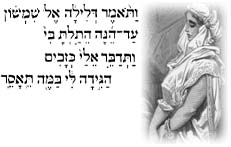|
|



|
"Throughout
the term of his vow as nazirite, no razor shall touch his
head;
it shall remain consecrated until the completion of his
term as nazirite of the Lord, the hair of his head being
left to grow untrimmed..." (Numbers 6:5)
Although
Judaism never encouraged asceticism, the Torah did make an
exception in the case of the Nazirite. The biblical Nazirite
— sthough an ascetic, he was definitely not a hermit —
acquired a holy status similar to that of the High Priest.[1]
The most famous Nazirite was Samson, whose unshorn hair held
the secret to his extraordinary statue. |
The biblical
Nazirite did not lead a monastic existence apart but, to the contrary,
was an active participant in all his familiar and communal affairs.
What set him apart from his fellows was his meticulous observance
of three prohibitions: he was forbidden to cut his hair, to drink
wine, and to come in contact with a corpse.
The uncut
hair of the Nazirite was truly his distinction.[2]
In this respect, he differed from the priest who, though forbidden
to shave his hair, was compelled to trim it.[3]
Thus the Nazirite could always be recognized by his appearance
and it is no wonder that the term for Nazirite can also refer
to his hair.[4]
The possibility exists that during Israel's early wars to conquer
the land of Canaan, whole armies would vow not to cut their hair
until victory was won. This would explain Samson's lifelong dedication
to battle the Philistines, the association of Nazirites (and prophets)
with the conquest in Amos 2:10-11, and the possible Nazirite vow
taken by Deborah's soldiers.[5]
|

"And Delilah said to Samson: "You have been deceiving
me all along; you have been lying to me! Tell me, how could
you be tied up?"
|
Since hair
continues to grow throughout life (and apparently for a time after
death), it was considered by the ancients to be the seat of man's
vitality and life-force, and in ritual it often served as his
substitute. A bowl dating from the ninth century BCE found in
a Cypriot temple contains an inscription on its outside surface
indicating that it contained the hair of the donor. It was placed
there, if the reconstructed text is correct, as "a memorial"
to Astarte,[6]
that is, as a permanent reminder to the goddess of the donor's
devotion.
However, one
must be careful not to attribute Samson's superhuman powers to
his Nazirite vow. The story of his magic locks is a prevalent
motif in Greek mythology that may have entered into the folklore
of the Danites, Samson's tribe, through their contact with their
neighbors, the Philistines — former
residents of the Greek world.
The offering
of hair is also attested in later times in ancient Babylonia,
Syria, Greece, and Arabia. The Syrian Lucian's comment merits
quotation: "The young men make an offering of their beards, while
the young women let their 'sacred locks' grow from birth and when
they finally come to the temple, they cut them. When they have
placed them in containers, some of silver and many of gold, they
nail them up to the temple, and they depart after each inscribes
his name. When I was still a youth I, too, performed this ceremony
and even now my locks and name are in the sanctuary."
It was said
of Absalom, one of King David's sons, that when he cut his hair
— he had to have his hair cut every
year, for it grew too heavy for him — the
hair of his head weighed two hundred shekels by the royal weight.[7]
The Hebrew verse indicates that Absalom was wont to cut his hair
mikkets yamim la-yamim; if this phrase is rendered "annually
at the yearly feast," then the possibility exists that Absalom
offered up his shorn hair at the sanctuary. It was customary for
pre-Islamic Arabs to deposit their shorn hair at a tomb of a revered
saint as a sacrificial act. An analogy persists in the custom
of present-day Hasidim who pilgrimage to Meron in the Galilee
on Lag ba-Omer in order to cut their children's hair for the first
time at the purported tomb of Rabbi Simeon Bar Yohai.
|
[1]
Scripture records two kinds of Nazirite status: lifelong
and temporary., both of which result from a vow. In the
case of
a lifelong Nazirite, the vow is imposed by others, usually
by a pregnant mother, whereas the vow of a temporary Nazirite
is self-imposed. [back]
[2] Judg. 16:12; I Sam. 1:11 [back]
[3] Ezek. 44:20 [back]
[4] Num. 6:6,7,12,18; Jer. 7:29; note the
parallelism in Gen. 49:26; Deut. 33:16 [back]
[5] cf. Judg. 5:2, "when they grew their
hair long in Israel" [back]
[6] Certain gifts and rites in Israel's sanctuary
also served as memorials, e.g., Exod. 28:12,29; 30:16; Num.
10:10; Zech. 6:14 [back]
[7] 2 Sam. 14:26 [back] |
|

From:
The JPS Commentary: Numbers Commentary by Jacob Milgrom,
JPS, 1990
|
HAIR
Table of Contents
|
|
|
|